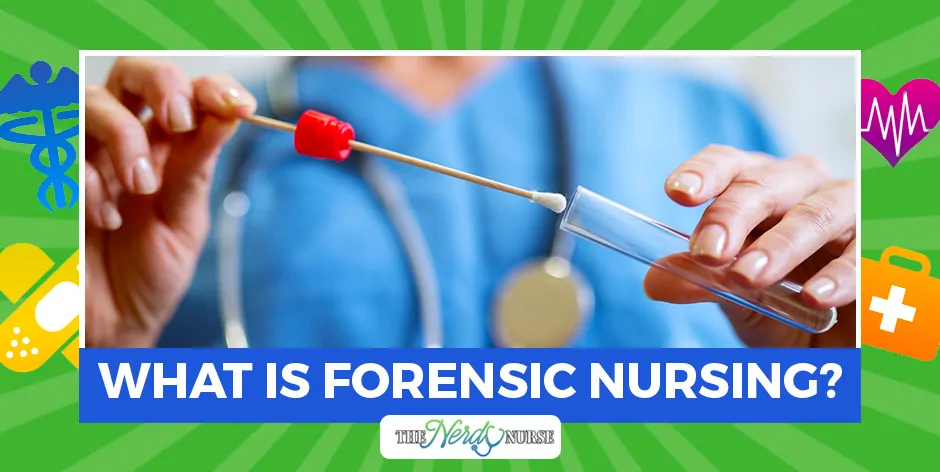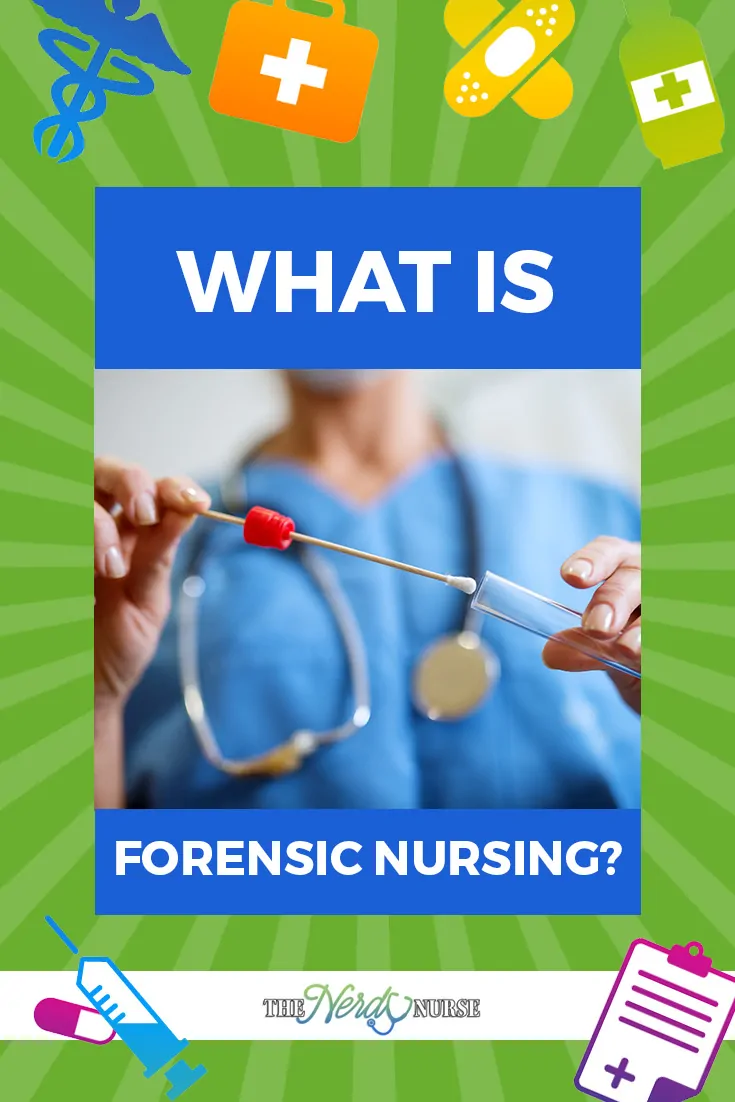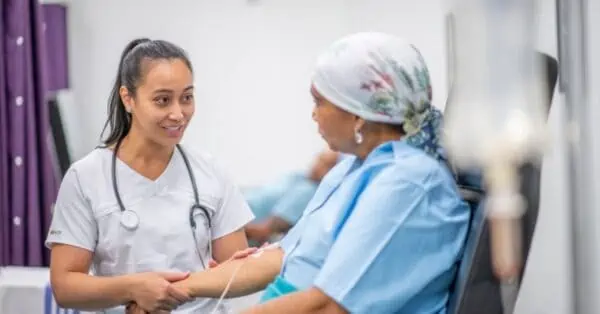If you’ve ever asked yourself “what is forensic nursing” you may be considering a change to what you consider the best nursing specialty or becoming a new nurse. This relatively new nursing specialty provides a valuable service to patience that often experience vicious crimes. Let’s dive in and learn a little more about the nursing specialty, the career prospects, and how to become a forensic nurse.
What is Forensic Nursing?
If the word forensic brings forth images of CSI dramas and people writing with markers on glass walls you are not alone. While forensic nursing is similar in many ways to the popular TV drama, it is also much more.
The word forensic simply means the application of scientific methods and techniques to the investigation of crimes. When applied to nursing science, forensic nursing occurs at the intersection of the health and legal systems. Forensic nurses have many roles and responsibilities in both the legal and medical system. They care for victims, collect evidence, and provide valuable testimony in court.
Care of Victims
The first and most immediate role of the forensic nurse is to care for the victims of a crime. They must meet the immediate physical and emotional needs of victims that present to the emergency department after an event. Forensic nurses are often embedded in emergency departments and care for people who are victims of sexual assault, domestic violence, child abuse and neglect, elder abuse, and victims of mass casualties and disasters.
Often victims who are presenting to an emergency department are afraid and traumatized by a violent incident. They may have been injured by someone they know and trust, and have difficulty trusting another person, or are fearful of being judged. The forensic nurse uses her vast skills in therapeutic communication and their caring demeanor to make the victims feel safe, comfortable and understood. This can take a fair amount of time, often an hour or more, before the patient may feel comfortable enough for a physical examination – time that an emergency room nurse would never have available for them.
Forensic nurses have a vast knowledge and understanding of the legal system and can help to guide victims, helping them understand their choices and their rights. They are also very skilled in the identification of injuries, including hidden injuries that are so important in cases of child abuse.
[easy-tweet tweet=”If the word forensic brings forth images of CSI dramas and people writing with markers on glass walls you are not alone. While forensic nursing is similar in many ways to the popular TV drama, it is also much more.” url=”https://thenerdynurse.com/what-is-forensic-nursing/”]
Collect Evidence
The next role of the forensic nurse is to collect valuable evidence. This may involve performing an internal exam on women who have been sexually assaulted, taking photographs of any bruising or other injuries, and documenting relevant information such as the behavior of a victim, or the relative physical state of a child or elderly person who is suspected of being neglected.
Sexual Assault Nurse Examiners are registered nurses who receive specialized training in examination, including vaginal speculum examinations, and in counseling for women who are victims of sexual assault. They are well versed in the legal system and are trained in collecting and packaging evidence for court including tissue samples, photographic evidence, and physical evidence such as clothing.
Give Testimony
The final role of the forensic nurse is to give testimony in court cases. Forensic nurses receive specialized training in providing excellent and accurate testimony and are essential witnesses in legal proceedings as they are often the first professional to have contact with the victim, even before the police.
In cases of sexual assault, SANE nurses represent the victims and serve as expert witnesses offering testimony based on their carefully documented evidence.
Care of Perpetrators
There is another subset of forensic nurses that often go unnoticed, and that is nurses caring for perpetrators of crimes, either intentional or unintentional. This includes nurses who work in correctional facilities and those working in psychiatric hospitals caring for people who have committed crimes and have psychiatric, social and behavioral disorders. While these people may not be deemed criminally responsible for their actions, they often must be removed from regular society with the goal of rehabilitation and support.
Forensic nurses provide a valuable role in both the medical and legal systems. They offer the one on one medical care and support that victims require, care that would be impossible for emergency staff to deliver. They also provide value to the legal system with their in-depth knowledge and skill in evidence collection, documentation, and expert testimony. Their caring demeanor and clinical expertise change the lives of victims every day.
Importance of Forensic Nursing
Registered nurses play a very integral role in the healthcare system. An entry level nurse can perform complete and focused assessment, provide nursing diagnosis, plan nursing interventions in relation to the medical management, evaluate the outcomes of the interventions and document the nursing care. If combined with the knowledge and skills of forensic nursing, this can be a formidable profession that can assess and provide nursing care to victims of violence, abuse, and trauma. Forensic nurses can find the necessary evidence and give testimony afterwards if summoned in court. The evidences and medical information obtained during the time of medical attention can help apprehend or prosecute the perpetrators and convict them appropriately. Forensic nurses are also capable of providing emotional and psychological support in these times of distress.
The U.S. Vice President Joe Biden was once quoted on the importance of forensic nurses:
“Forensic Nurses play an integral role in bridging the gap between law and medicine. They should be in each and every emergency room”
How to become a Forensic Nurse?
For the past 25 years, forensic nursing is no longer confined in the emergency rooms of the hospitals. It expanded its practice in a variety of specialized roles like child abuse nurse examiner, psychiatric forensic nurse, corrections nurse, and forensic clinical nurse specialist.
Forensic nursing requires a bachelor’s degree or an associate degree in nursing. Some nurses opted to start their clinical or hospital experience immediately as a registered nurse then pursue to study the specialty later. This allows them to familiarize some protocols and practices that existing forensic nurses are already doing in the clinical field. Basically, they focus on making sure they pass the NCLEX and become a registered nurse then become certified in a subject such as Sexual Assault Nurse Examiner (SANE) offered by the International Association of Forensic Nurses (IAFN).
Others like continuity in their academic experience and starts the master’s degree in forensic nursing immediately after graduating from their bachelor’s or associate degrees.
Certification requirements and renewal will depend on your own state. Make sure that you complete and fulfill these to maintain a license in forensic nursing.
The hospital is not the only setting where forensic nurses are present. They can work in schools, prisons and jails, clinics, and tissue and organ donation departments.
According to the US Bureau of Labor Statistics (BLS), forensic nurses earn a median salary of $67,490 per year, which is in line with how much an RN makes.
- See Also: What is an Advanced Practice Nurse?
Forensic Nursing: A Handbook for Practice










